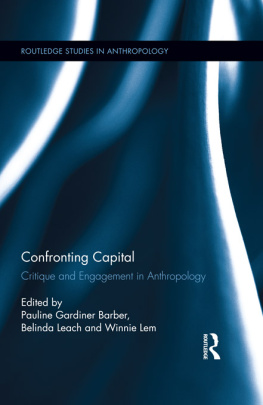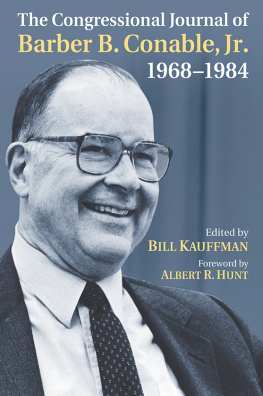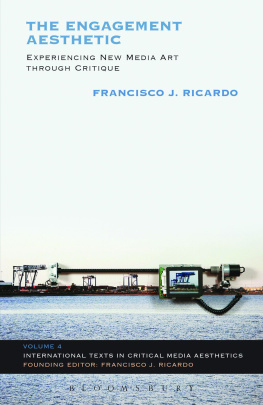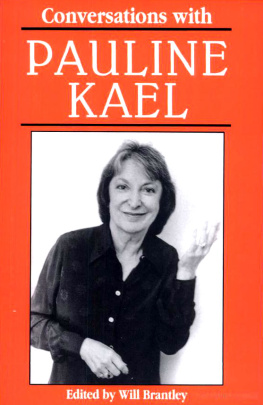Barber Pauline Gardiner - Confronting capital: critique and engagement in anthropology
Here you can read online Barber Pauline Gardiner - Confronting capital: critique and engagement in anthropology full text of the book (entire story) in english for free. Download pdf and epub, get meaning, cover and reviews about this ebook. City: London, year: 2012, publisher: Taylor and Francis;Routledge, genre: Politics. Description of the work, (preface) as well as reviews are available. Best literature library LitArk.com created for fans of good reading and offers a wide selection of genres:
Romance novel
Science fiction
Adventure
Detective
Science
History
Home and family
Prose
Art
Politics
Computer
Non-fiction
Religion
Business
Children
Humor
Choose a favorite category and find really read worthwhile books. Enjoy immersion in the world of imagination, feel the emotions of the characters or learn something new for yourself, make an fascinating discovery.
- Book:Confronting capital: critique and engagement in anthropology
- Author:
- Publisher:Taylor and Francis;Routledge
- Genre:
- Year:2012
- City:London
- Rating:5 / 5
- Favourites:Add to favourites
- Your mark:
- 100
- 1
- 2
- 3
- 4
- 5
Confronting capital: critique and engagement in anthropology: summary, description and annotation
We offer to read an annotation, description, summary or preface (depends on what the author of the book "Confronting capital: critique and engagement in anthropology" wrote himself). If you haven't found the necessary information about the book — write in the comments, we will try to find it.
Confronting capital: critique and engagement in anthropology — read online for free the complete book (whole text) full work
Below is the text of the book, divided by pages. System saving the place of the last page read, allows you to conveniently read the book "Confronting capital: critique and engagement in anthropology" online for free, without having to search again every time where you left off. Put a bookmark, and you can go to the page where you finished reading at any time.
Font size:
Interval:
Bookmark:

| Student Mobility and Narrative in Europe | |
| The New Strangers | |
| Elizabeth Murphy-Lejeune | |
| The Question of the Gift | |
| Essays across Disciplines | |
| Edited by Mark Osteen | |
| Decolonising Indigenous Rights | |
| Edited by Adolfo de Oliveira | |
| Traveling Spirits | |
| Migrants, Markets and Mobilities | |
| Edited by Gertrud Hwelmeier and Kristine Krause | |
| Anthropologists, Indigenous Scholars and the Research Endeavour | |
| Seeking Bridges Towards Mutual Respect | |
| Edited by Joy Hendry and Laara Fitznor | |
| Confronting Capital | |
| Critique and Engagement in Anthropology | |
| Edited by Pauline Gardiner Barber, Belinda Leach and Winnie Lem |
Critique and Engagement in Anthropology
Edited by
Pauline Gardiner Barber,
Belinda Leach and
Winnie Lem

First published 2012
by Routledge
711 Third Avenue, New York, NY 10017
Simultaneously published in the UK
by Routledge
2 Park Square, Milton Park, Abingdon, Oxon OX14 4RN
Routledge is an imprint of the Taylor & Francis Group, an informa business
2012 Taylor & Francis
The right of Pauline Gardiner Barber, Belinda Leach and Winnie Lem to be identified as the authors of the editorial material, and of the authors for their individual chapters, has been asserted in accordance with sections 77 and 78 of the Copyright, Designs and Patents Act 1988.
All rights reserved. No part of this book may be reprinted or reproduced or utilised in any form or by any electronic, mechanical, or other means, now known or hereafter invented, including photocopying and recording, or in any information storage or retrieval system, without permission in writing from the publishers.
Trademark Notice: Product or corporate names may be trademarks or registered trademarks, and are used only for identification and explanation without intent to infringe.
Library of Congress Cataloging-in-Publication Data
Confronting capital: critique and engagement in anthropology / edited by
Pauline Gardiner Barber, Belinda Leach and Winnie Lem. 1st ed.
p. cm. (Routledge studies in anthropology ; 6)
Includes bibliographical references and index.
1. Marxist anthropology. 2. Political anthropology. I. Barber, Pauline Gardiner II. Leach, Belinda, 1954 III. Lem, Winnie.
GN345.15.C66 2012
306.2dc23
2012002883
ISBN13: 978-0-415-89629-0 (hbk)
ISBN13: 978-0-203-10632-7 (ebk)
Typeset in Sabon
by IBT Global.
This book is dedicated to the memory of Krystyna Sieciechowicz
PAULINE GARDINER BARBER, BELINDA LEACH AND WINNIE LEM
LESLEY GILL
LEIGH BINFORD
KRYSTYNA SIECIECHOWICZ
DON KALB AND OANE VISSER
LINDA GREEN
BELINDA LEACH
GERALD SIDER
GASTN GORDILLO
JUDITH WHITEHEAD
CHRISTOPHER KRUPA
WENONA GILES
MARIE FRANCE LABRECQUE
SUSANA NAROTZKY
GAVIN SMITH
This volume comes out of a continuing dialogue among colleagues, scholars and friends in many different fora. In particular, the editors would like to thank the participants of the Anthropology and Political Economy Seminar (APES) for their commitment to critical scholarship and openness to debate. Several of the essays in this collection were first presented in panels entitled Confronting Capitalism at the Canadian Anthropology Society annual conference in Vancouver in 2009. We thank Ananth Aiyer, Malcolm Blincow, August Carbonella, Guillermo de la Pea, Kirk Dombrowski, Leslie Jermyn, Tania Li, David Nugent, Roger Rouse, Jane Schneider, and Peter Schneider who also participated in those panels and contributed to the associated discussions
Those panels were organized to celebrate and engage with the contributions of Gavin Smith to anthropology. Gavins workin writing and through conversationhas richly shaped and influenced the scholarly trajectories of all the contributors to this volume, for whom he has been wise teacher and mentor, insightful interlocutor, supportive colleague, and kind friend. His particular combination of intellectual generosity and challenge has been felt by all of us, and our work is much the better for it. Our thanks and appreciation go to him for this ongoing engagement.
A huge thank you is owed to Clare Morgan and William Campbell whose work in helping to prepare the manuscript was excellent and indispensable. We also extend our thanks to Max Novick at Routledge for his enthusiastic support, kindness and patience. Also at the press, we thank Eleanor Chan and Jennifer Morrow for their diligent work in overseeing the production of the manuscript. Thanks also to Bruce Barber and Ross Butler for their critical commentary and encouragement during various phases in the preparation of this work. A final note of thanks is owed to the anonymous reviewers of this volume for their enthusiastic and insightful commentary.
Introduction
Confronting Anthropology: The Critical Enquiry of Capitalism
Pauline Gardiner Barber, Belinda Leach and Winnie Lem
They tell you we are dreamers. The true dreamers are those who think things can go on indefinitely the way they are. We are not dreamers. We are the awakening from a dream which is turning into a nightmare. We are not destroying anything. We are only witnessing how the system is destroying itself. Slavoj iek addressing the Occupy Wall Street protest, October 2, 2011.
As our world continues to be beset by profound transformations and crises, people are called upon to contend with the uncertainties and deprivations of a global economy restructured by the architects of a neoliberal order.
Linked to these vociferous politics are the struggles of ordinary people that centre upon the everyday dilemmas and routinized practices associated with securing a livelihood, ever subject to the vagaries of capital and the elites who are its proponents, brokers, and primary beneficiaries. In Asia, new generations of workers who have come of age during this era of tumult are engaged in mobilizations to contest the conditions of exploitation that prevail in workplaces conditioned by the drive toward hyper accumulation in contemporary production regimes. In China, the factory of the World, such struggles against national and international capital embodied in the transnational firm have involved collective suicides, traffic blockages, and strikes as well as civil disobedience in the face of pro-capitalist development at any cost (Lee 2007; Ngai et al. 2010).
In their work, anthropologists have unique critical purchase on the complexities and contradictions of these and varied other responses to capitalism, its ever-changing faces. This volume is in fact a collaboration of scholarsall anthropologistswhose intellectual labor is precisely devoted to confronting capital. Its central purpose is to advance a framework for apprehending the complex contours of peoples everyday struggles against deprivation and precariousness. It does so through the consistent application of a critical political economy perspective. We contend that the tradition of political economy in anthropology is fundamental to our disciplines interrogation of the contemporary world. While our work examines what provokes people to engage with their political worlds with such courage, force and often with violence, the chapters here are primarily motivated by a deep commitment to developing an understanding of the entanglements of ordinary people within capitalism. Through fine-tuned ethnography our analyses are focused on the routinized encounters with capital that do not necessarily result in collective contestations. While we pay attention to preconditions for political mobilization, our work critically enquires into the challenges of the complicated quotidian. For the people whose lives we attempt to represent, capital is confronted in overtly political acts, but also, importantly, in the everyday practices of pursuing livelihoods, securing food and finding shelter. We take our title thus to incorporate a double agency in that both the anthropologists writing in this book, and the people we write about, are confronting capital.
Font size:
Interval:
Bookmark:
Similar books «Confronting capital: critique and engagement in anthropology»
Look at similar books to Confronting capital: critique and engagement in anthropology. We have selected literature similar in name and meaning in the hope of providing readers with more options to find new, interesting, not yet read works.
Discussion, reviews of the book Confronting capital: critique and engagement in anthropology and just readers' own opinions. Leave your comments, write what you think about the work, its meaning or the main characters. Specify what exactly you liked and what you didn't like, and why you think so.










